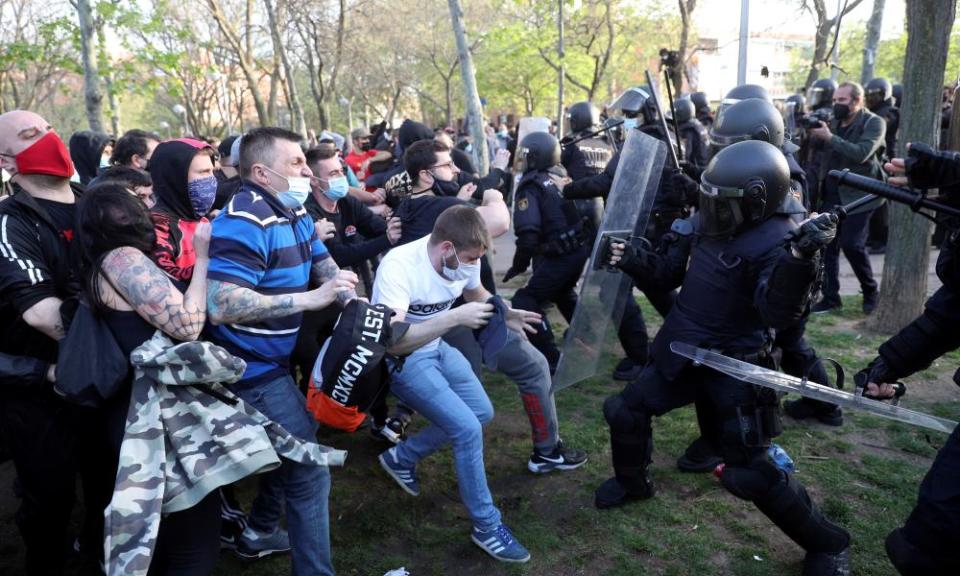‘We’re all Ayuso’: lockdown sceptic poised for victory in Madrid election
The late lunchers who linger over coffee and wine on the terraces of Calle Ponzano, Madrid, sit beneath banners bemoaning the neighbourhood’s noise levels and among posters bearing the capital’s most ubiquitous face.
From the windows of many of the bars and restaurants that line the bustling street – and from the walls of metro stations across they city – stare the eyes of Isabel Díaz Ayuso, regional president of Madrid, scourge of Pedro Sánchez’s Socialist-led coalition government, and unofficial patron saint of a hefty proportion of the region’s hospitality industry. Her campaign posters and letters feature little more than her image and the single word libertad. Freedom.
Tempers have flared during the campaign, ensuring the tone of Madrid politics is as immoderate, fractious and divisive as that of Spain’s national politics, and as madrileños prepare to vote in next Tuesday’s snap regional election, polls suggest Ayuso is on course for victory – and that she is managing to appeal to voters beyond her conservative People’s party (PP).
The facade of Vagalume, one of the six bars José Nieto owns in and around Ponzano, bears two Ayuso posters. The first reads: “We’re all Ayuso. Thanks for looking after us.” The second: “Thank you. The hospitality sector is really important. We all enjoy it, so let’s respect it.”
Nieto, 56, didn’t vote in the last election. Ayuso barely flickered across his radar until the pandemic hit and she began her frequent clashes with the central government and even the region’s own health experts, insisting Madrid’s bars and restaurants needed to operate as normally as possible for the sake of the economy and normality.
“I admire her now for the decisions she’s taken in the face of opposition from the Spanish government and in favour of Spain’s workers,” says Nieto. “I haven’t voted for the past 15 years, but I’ll vote for her next week.”
Nieto is not normally a fan of Spain’s political class – “generally, the further politicians stay away from you the better”. He says Ayuso’s appeal to him has nothing to do with the PP and everything to do with the individual and her actions. “It’s not about her party, it’s about her.”

Beyond the hospitality industry – her face also appears on a beer label – Ayuso’s mix of idiosyncratic bluntness, defiance and naked appeals to rightwing and far-right voters is paying off.
To her supporters she is a libertarian, a champion of small businesses and, perhaps most importantly, a breath of fresh air after a year of restrictions and sacrifices. To her opponents she is an opportunist, a pedlar of reactionary non-sequiturs, a dog-whistle politician and an ally and legitimiser of her rivals in the far-right Vox party. Ayuso, who dissolved her coalition with the centre-right Citizens party, has not ruled out entering into a coalition with Vox if she lacks the votes to go it alone, saying they share common ground on “some fundamental questions”.
But her political stance is not the only issue in play. Ayuso’s stewardship of the pandemic in the region – which was home to almost 15,000 of Spain’s 78,216 Covid victims – has been bitterly criticised by many.
Critics note that the number of Covid cases per 100,000 people over the past fortnight is 385 in Madrid, compared with a national average of 229. Meanwhile the proportion of intensive care unit beds occupied by Covid patients in the Madrid region stands at 44.7%; across the rest of the country as a whole it is 22.9%.
Medical experts also point out that while Ayuso has so far spent €153m (£133m) on a new pandemic hospital, healthcare in the region – which has been in the hands of the PP for almost three decades – remains chronically underfunded.
If her minimalist campaign material gives little clue as to Ayuso’s agenda, some of her recent pronouncements have offered a little more insight. When the Podemos leader, Pablo Iglesias, announced he was stepping down as one of Spain’s deputy prime ministers to run as his party’s candidate in the Madrid election, Ayuso tweeted: “COMMUNISM OR FREEDOM. 4 May.”
COMUNISMO O LIBERTAD.
4 de mayo.— Isabel Díaz Ayuso (@IdiazAyuso) March 15, 2021
“When they call you a fascist, you know you’re doing it right … and you’re on the right side of history,” she said in March. A few weeks later she acknowledged that life in Madrid was expensive and difficult, but said the good thing about the city was that you could go for a beer with family and friends at the end of a hard day’s work.
Ayuso expanded on her quality-of-life thesis on Wednesday, telling a radio station: “When you come to Madrid, you can change your partner or your job and never have to run into them again.”
Pablo Simón, a political scientist at Madrid’s Carlos III University, attributes Ayuso’s strong performance in the polls to two factors. First, she has established herself as a more credible opposition figure to the central government than the PP’s national leader, Pablo Casado. Second, she has “managed to tune in to that general feeling that people are really tired of the pandemic and they want normality and to be free”.
Polls suggest Ayuso is more popular among Vox voters and the ever-dwindling band of Citizens supporters than their own parties’ candidates. “Her success on the right is totally overwhelming and her confrontations with the Sánchez government have paid dividends,” says Simón.
Faced with Ayuso’s growing appeal to its voters, Vox has sought to stay relevant and raise its profile by using inflammatory posters to once again demonise unaccompanied migrant children. At the beginning of April, riot police had to separate protesters and the party’s supporters after it staged a rally in the traditionally leftwing working-class Madrid neighbourhood of Vallecas.

Iglesias, who was never entirely shackled by his chain of office, has denounced Ayuso’s handling of the pandemic in care homes as “criminal” and accused Vox of being “apologists for far-right terrorism” and defenders of the Franco era.
The Podemos leader walked out of a TV debate after Vox’s candidate, Rocío Monasterio, tried to cast doubt on the death threat he and his family had received along with four assault rifle bullets. Police are also investigating after intercepting a letter addressed to Ayuso that contained two bullets.
Despite the endless invocations of libertad and the confetti-like scattering of promises as parties on left and right compete for votes, not all the people of Madrid feel they are being listened to.
Half an hour’s drive from the bars of Ponzano lies the shantytown of Cañada Real. Since last October, thousands of people living in Europe’s largest informal settlement have been without electricity. The power provider blames the outages on huge surges which, according to the Madrid regional government, are due to illegal marijuana plantations overloading the system.
Sara Benayad, four months pregnant and seven months without electricity, speaks over the noise of one of the generators that people use to power sector six of the Cañada Real. She is not holding her breath and neither are her friends and relatives.
“The elections are happening and we’re still stuck on the margins in the same situation,” says Benayad. “Whoever is lucky enough to win needs to think about the thousands of children living without electricity in the same country as them. Ayuso talks about freedom and about helping people, but where’s the freedom if we’re living like this in 2021?”

 Yahoo News
Yahoo News 
